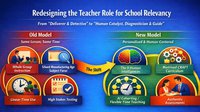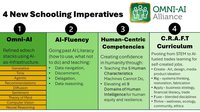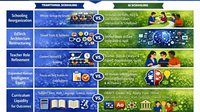THROUGHOUT human history, there have always been those rare individuals who defied the boundaries of specialized knowledge, excelling across multiple disciplines with a breadth and depth that seemed almost superhuman. From Leonardo da Vinci to Benjamin Franklin and beyond, polymaths have pushed the frontiers of human knowledge and creativity.
For the last two years, technology has been recalibrating our traditional notions of focus, multitasking, and intellectual depth. In some ways, we stand on the precipice of a new renaissance, one where the barriers to polymath-like achievement are lowering, and where brilliant minds can push the frontiers further than ever before.
Think of Hildegard of Bingen (1098-1179), E.T.A. Hoffmann (1776-1822), Marie Curie (1867-1934), Rabindranath Tagore (1861-1941), Arnold Schoenberg (1874-1951), or more recently the former German Chancellor Angela Merkel (1954 – present) who holds a doctorate in quantum chemistry. Historical examples of renaissance men – and women – abound.
There are in fact countless examples of mastery across multiple domains through sheer intellectual prowess, insatiable curiosity, and decades of dedicated study. The point of all this (a point to which you may very well by now be looking forward) has to do with generative AI and extended thinking abilities.
Enter AI-Enhanced Integrative Thinking
What I tentatively call “AI-Enhanced Integrative Thinking” is a cognitive paradigm that marries human intellect with artificial intelligence to create a sum greater than its parts. It’s a cognitive dance where our ability to think critically and abstractly in multiple arenas simultaneously is enhanced by AI’s capacity to process vast amounts of information and generate novel connections. This symbiosis allows us to
simultaneously engage with multiple complex ideas, maintaining depth of thought while navigating a breadth of topics that would traditionally overwhelm even agile minds.
Unlike traditional multitasking, which often leads to shallow engagement across tasks, AI-Enhanced Integrative Thinking maintains depth while expanding breadth. It allows us to think deeply and widely on multiple levels at the same time, for instance by engaging in multiple chats—not simultaneously, but asynchronously and always at our disposal—allowing us to reflect, engage, and reflect continuously on
several topics.
From an educational perspective, perhaps the most exciting aspect of AI-Enhanced Integrative Thinking is its potential to democratize interdisciplinary expertise for students. While not everyone can be a da Vinci or a Curie, AI technology lowers barriers to meaningful engagement across multiple disciplines. It allows individuals to leverage their unique perspectives and experiences, combining them with AI-assisted knowledge acquisition to contribute novel insights. I suspect we will see an exponential rise in high school students making connections between advanced concepts that even seasoned researchers might overlook.
Curriculum Consequences
At postgraduate levels of study, the traditional model of higher education, with its disciplinary boundaries and predetermined course sequences, may come under pressure. If AI-Enhanced Integrative Thinking enables students to rapidly assimilate and synthesize information across multiple fields, universities may need to reimagine their curricula to support this new cognitive approach.
Cross-disciplinary degrees and programs are not new, but we might see a stronger emergence of “meta-disciplines” that transcend traditional academic silos, encouraging students to explore complex problems through multiple academic lenses and traditions simultaneously. For instance, a course on climate change might seamlessly integrate elements of environmental science, economics, public policy, and communication studies, with AI tools helping students navigate the interdisciplinary space and make the best possible connections at the best possible times in their learning process.
Redefining Expertise and Assessment
As students gain the ability to rapidly acquire and synthesize knowledge across multiple domains, traditional notions of academic excellence will be challenged even more than today. Rather than demonstrating mastery through standardized exams or narrowly focused dissertations, students might be evaluated on their ability to generate innovative solutions to complex, interdisciplinary problems.
Examination methods need to address how we can reliably assess that a student has learned what they were supposed to, and how we can best give students a meaningful opportunity to demonstrate this. We might see the rise of “cognitive portfolios” that showcase a student’s thought processes and intellectual journey across various fields, rather than focusing solely on accumulated knowledge.
Conclusion
AI-Enhanced Integrative Thinking presents both transformative opportunities and significant challenges for higher education. By leveraging AI to augment human cognition while nurturing essential human skills, higher education can help cultivate a new generation of polymaths to go on to do marvellous things.
Of course, the integration of AI into our intellectual processes isn’t about returning to a past era of intellectual giants. It’s about moving forward into a future where the collaborative potential of humans and AI can unlock new frontiers of knowledge and innovation. None of this is easy and it requires planning and a commitment to inclusivity, ensuring that the benefits of AI-augmented cognition are accessible to all.
I believe we are on the brink of an educational and intellectual renaissance. By embracing AI-Enhanced Integrative Thinking (or similar thinking), we have the opportunity to redefine expertise, reshape educational paradigms, and inspire a new era of intellectual achievement that mirrors the ingenuity and breadth of historical polymaths while surpassing their limitations.
Arguably, the polymaths of history forge new paths in education and intellectual achievement. After all, history tends to repeat itself.
Even in the Age of AI.
About the author

Jeppe Klitgaard Stricker is Head of Administration at the Department of Clinical Medicine, Aalborg University, Denmark. He is also a writer, speaker, and advisor on AI and leadership in higher education.











